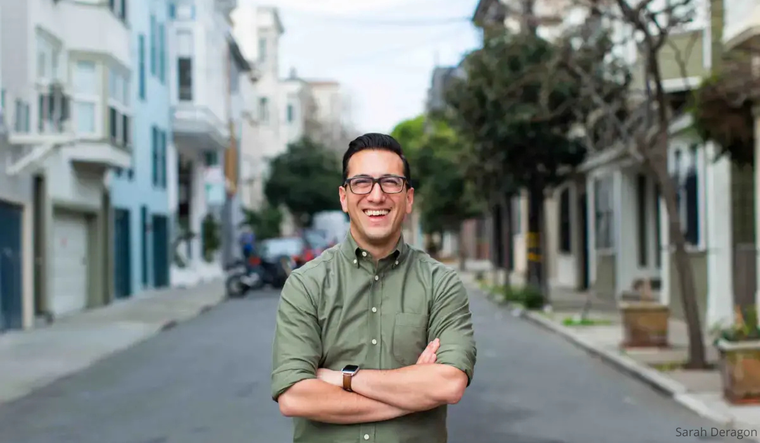Our Most Precious Resource Isn't Money—It's Time. Here's How to Feel Like You Have More of It from UCLA's Cassie Holmes
In 2013, Cassie Holmes was sitting on a train from New York to her home in Philadelphia and she was contemplating quitting everything. The pressures of trying to be a good parent and partner, to publish and perform at work, to plow through the never-ending pile of chores—it all felt like too much to do with not enough hours in the day to do it all.
As a social psychologist and professor at UCLA’s Anderson School of Management, Holmes is literally a pro at finding answers to questions by looking at data. So, it’s no surprise she looked to science to try to help her answer the question that was prompting her daydreams about quitting her job and living on a beach somewhere with her family: How could she stop feeling like she was speeding through life and score more time so she could actually experience life?
The answer, in a nutshell: It’s not about being time rich, but rather about making the time you have rich.
“The answer isn’t how many hours in the day we have available, but how we spend the hours we have,” says Holmes. “That’s what drove my research and the course I’ve been teaching my MBA students: How do we invest the hours of our day so that at the end of the day, we look back and instead of feeling stressed, overwhelmed, and depleted, we feel fulfilled and—even if we were busy?”
The good news: There are many surprisingly simple ways (which don’t include quitting your job!) to vastly improve your sense of time and well-being. The Sunday Paper sat down with Holmes to find out what they are—and how all of us can start implementing them in our lives starting today.
A Conversation with Cassie Holmes
You say that that time isn’t just the problem, it’s the solution. Tell us more about that!
The key is identifying the ways of spending time that are really worthwhile—doing the things that make you happy and feel fulfilling. Those can come from your personal life, doing simple things with the people you love. It can also come from your professional life, like when you actually have the uninterrupted time to do the work you set out to do.
The key is filling our time intentionally. We have to put the things that matter into our schedules first so we make the time to do those things.
Think back over the last two weeks: When are the moments you felt the most joy? Even during your busiest weeks there are moments you feel joy. And often, it’s the simple moments. I have a weekly coffee date with my 7-year-old daughter. It’s just us, we go to our local coffee shop, and we chit chat. Even though it’s only 30 minutes, those 30 minutes impact my entire week. It’s those 30 minutes that cement and cultivate our connection.
So really, it’s not how much time you have or how much time you spend on various activities. Feeling time affluent is about making sure what you’re spending time on has the biggest emotional impact.
You say that to become “time affluent” we need between two and five hours of free time a day—not less, not more. What has your research shown about why this is?
In our research we found that when the majority of your day is spent relaxing or on “passive leisure” (things like watching TV, sitting on a beach with nothing to do), it’s not actually as satisfying as we think it might be. Remember your last beach vacation, when on Day Three you were really bored and wanted to do something? This is similar. We want to produce, to learn, to grow. But we have to balance that with some time off. Less than two hours of free time means you won’t feel you have any time for the stuff that fulfills you; more than five hours means a drop in satisfaction.
I think this is really good news. Two hours is attainable! If I look at how I spend my days, between those half-hour coffee dates with my daughter, chats with my husband, going for a run, getting into a flow at work when I’m writing—these activities that make me happy do add up. Those are minutes I wouldn’t have wanted to spend in any other way.
You write about time tracking and how it can help us make sure we’re spending our free time in ways that make us happiest. Take us through this time-tracking exercise.
This is so helpful for lots of reasons! What this does is allow you to identify for yourself what are the activities that are most worthwhile—and what are a waste.
Here’s how to do it: Over the course of a week, write down every activity you do every 30 minutes or so, and then give it a rating of how enjoyable it is on a scale of 1-10 (1 being the pits and 10 being awesome). It gives you an incredible data set that shows you what’s filling your time that you love (or not), and also how much time you’re spending across your activities.
What are a few simple ways all of us can feel like we have more time—immediately?
1. Treat the weekend like a vacation: Science backs up that even short breaks can increase your happiness, and it doesn’t require jetting off somewhere. When we randomly assigned people to treat the weekend like a vacation and others to treat it like a regular weekend, those with the vacay mindset enjoyed their weekend more and were happier. And it wasn’t that they drastically changed how they spent their time—the mindset just helped them feel more present.
Treating the weekend like a vacation might mean spending a few additional minutes cuddling with your partner in bed; lingering over meals; and spending less time doing chores. But what is essential in this exercise is that you embrace a vacation mindset: enjoy simply being rather than your routine, incessant doing. This is how you make the hours, which you already have off, happier hours.
2. Bundle activities to make your chores feel less like a chore: This might include listening to audiobooks while commuting, watching your favorite TV show while on the elliptical, or turning on a podcast while cleaning. We all have tasks that we have to do, but which aren’t inherently fun. This bundling strategy makes these typically least happy hours happier hours.
3. Think in terms of years to inform how to spend hours: I did a survey that showed that those who take a birds-eye view of time (who think more broadly in terms of year, rather than more narrowly in terms of hours) find greater meaning in life and more satisfaction overall. Taking a broader view of time helps us to spend our hours on what’s important, rather than what seems urgent. It allows us to be proactive, rather than reactive, in how we allocate our days’ time.
One way to help you do this is to take your Grandma (or someone else’s Grandma!) to lunch. As we are grappling with decisions about how to lead a happy life, why not ask someone who has already done it successfully? Seek out an elder whom you admire and ask them to share what they are most proud of, what they regret most, and what decisions turned out to matter more and less than they had expected. Let their past experience inform your future.
Another great exercise I do with my students is to ask them to write their own eulogies. One of my students refused, forfeiting the grade, because she was so deeply afraid of death. I then reframed the assignment and asked her to instead write about the life she hopes to lead. It’s the same thing. The eulogy assignment isn’t really about death; it’s about life—the life you aspire to live, and hopefully already are living. If you aren’t, this assignment provides a useful nudge to get started.
What is your purpose? And are you taking this broader perspective of time to inform the life you aspire to live now. Who do you want to be? That can help tell us what to do right now!
To purchase Holmes' book, click here.
Cassie Holmes is a professor at UCLA’s Anderson School of Management, where she is an award-winning teacher and researcher. Holmes’s work on the intersection of time and happiness has been widely published in lead academic journals and featured in such outlets as NPR, The Economist, The New York Times, The Wall Street Journal, The Atlantic, The Washington Post, and more.
Please note that we may receive affiliate commissions from the sales of linked products.



